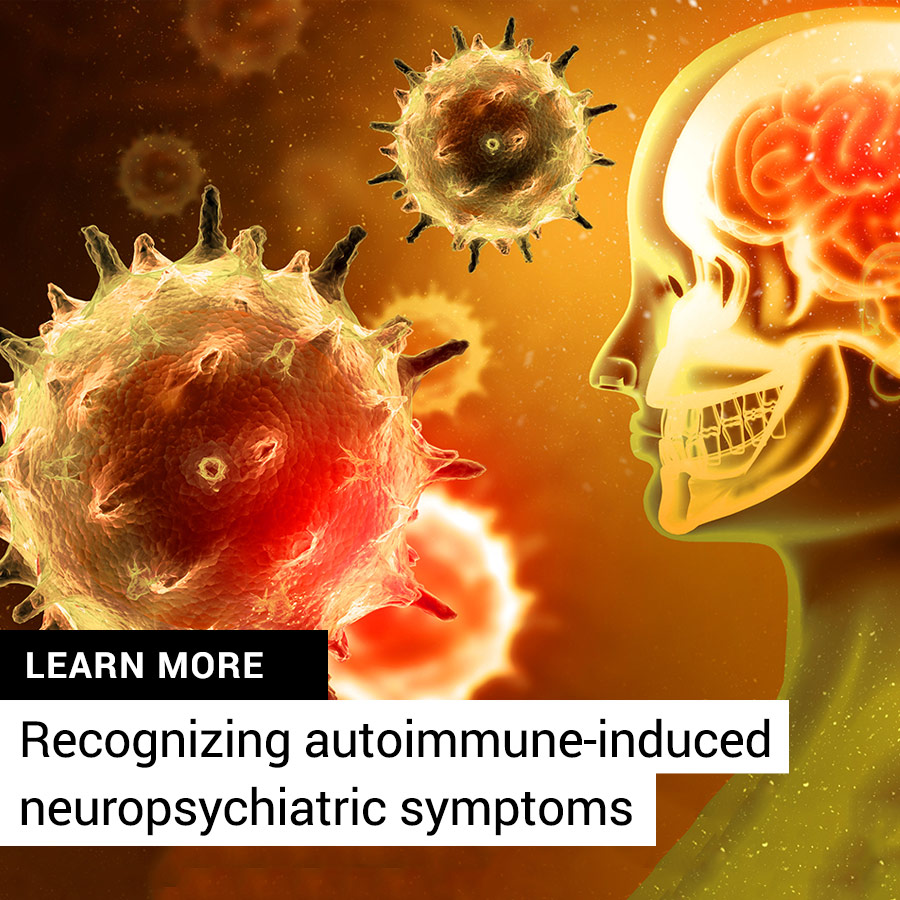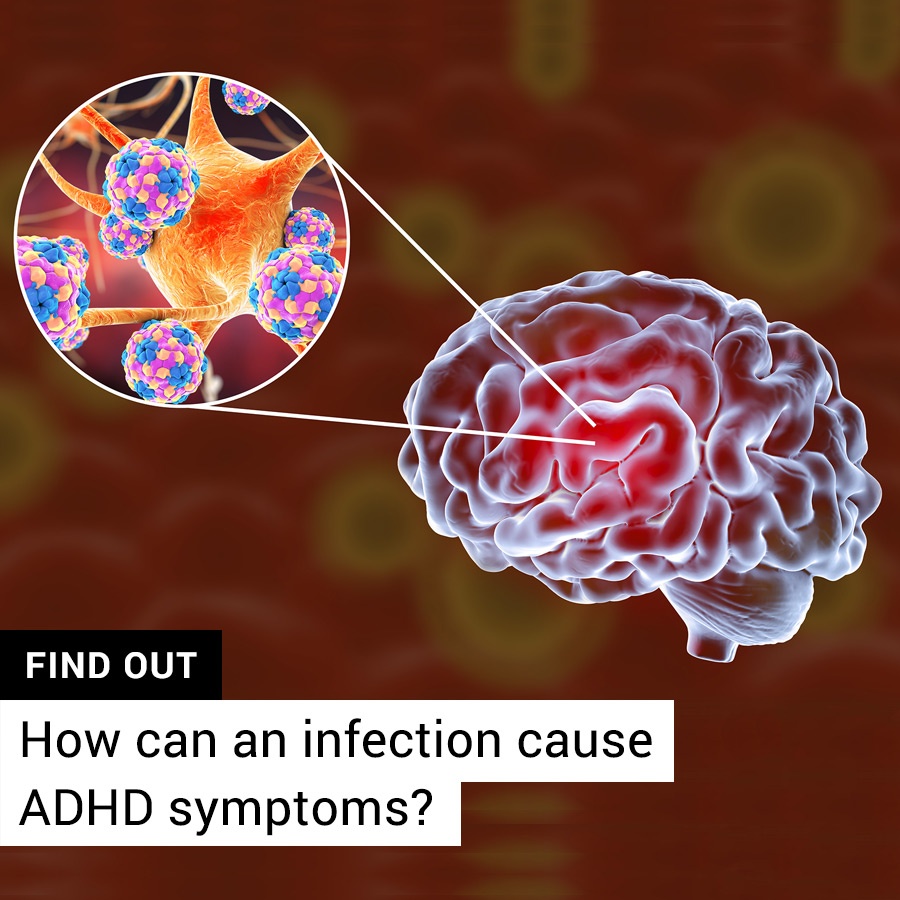Hyperactivity Disorder
Can adolescents or adults develop symptoms of ADHD?
Another study found, 90% of adult ADHD cases did not have a history of childhood ADHD. 2 Therefore, ADHD symptoms can develop in adults “and may be a syndrome distinct from childhood-onset ADHD.” 3
A variety of factors can impact whether an adolescent or adult develop ADHD. These can include genetics, environmental influences, and dietary habits. Even exposure to infections coupled with an immune dysfunction can cause ADHD-like symptoms in some individuals.
Abnormal immune system response triggering symptoms that mimic ADHD
Common infections, which often times may be hidden and go undiagnosed, can induce an abnormal immune system response. Antibodies produced to attack the harmful bacteria or virus, instead, may attack healthy cells in the brain.
An autoimmune attack on the brain can cause inflammation in a specific region of the brain (basal ganglia), triggering symptoms that mimic ADHD. Patients with an infection-triggered autoimmune encephalopathy may often be misdiagnosed with a psychiatric illness or behavioral disorder (such as ADHD), when instead they may have a treatable autoimmune disorder.
Strep infections, for example, have been linked to a subgroup of patients with ADHD. 4 And researchers have found that “streptococcal infections and autoimmune reactions against the basal ganglia are more frequent in ADHD patients.” 5Enteroviruses have also been associated with ADHD-like symptoms. Studies have shown that some patients with this virus experienced “increased symptoms of inattention, hyperactivity, oppositional defiance, internalizing problems, and increased likelihood of ADHD diagnosis.” 6
And researchers believe cytomegalovirus (HCMV), a common herpes virus, has the “potency to be responsible for at least part of ADHD cases.” 7 This virus has been shown to be associated with schizophrenia, bipolar disorder and cognitive deficits in certain populations. 8
Other infections linked to symptoms of ADHD
Other infections linked to symptoms of ADHD include: Candida albicans (a common yeast infection); allergic diseases (i.e. atopic eczema, chronic sinusitis, allergic rhinitis) 9; varicella-zoster virus (VZV), which causes chickenpox; herpes zoster (the shingles virus); middle ear infections 10 and allergic conjunctivitis. 11 An infection with Borrelia burgdorferi, the bacteria causing Lyme disease, can result in symptoms that mimic ADHD. 12
- https://www.ncbi.nlm.nih.gov/pubmed/27192050 Caye A, Rocha TB, Anselmi L, et al. Attention-Deficit/Hyperactivity Disorder Trajectories From Childhood to Young Adulthood: Evidence From a Birth Cohort Supporting a Late-Onset Syndrome. JAMA Psychiatry. 2016;73(7):705–712.
- https://www.ncbi.nlm.nih.gov/pubmed/25998281 Moffitt TE, Houts R, Asherson P, et al. Is Adult ADHD a Childhood-Onset Neurodevelopmental Disorder? Evidence From a Four-Decade Longitudinal Cohort Study. Am J Psychiatry. 2015;172(10):967–977.
- https://www.ncbi.nlm.nih.gov/pmc/articles/PMC5475268/ Agnew-Blais JC, Polanczyk GV, Danese A, Wertz J, Moffitt TE, Arseneault L. Evaluation of the Persistence, Remission, and Emergence of Attention-Deficit/Hyperactivity Disorder in Young Adulthood. JAMA Psychiatry. 2016;73(7):713–720.
- https://www.webmd.com/add-adhd/childhood-adhd/news/20000512/strep-infections-associated-adhd WebMD. Strep infections may be associated with ADHD. May 12, 2000.
- https://www.ncbi.nlm.nih.gov/pubmed/22956712 Toto, M., Margari, F., Simone, M., Craig, F., Petruzzelli, M. G., Tafuri, S., & Margari, L. (2015). Antibasal Ganglia Antibodies and Antistreptolysin O in Noncomorbid ADHD. Journal of Attention Disorders, 19(11), 965–970.
- https://pediatrics.aappublications.org/content/122/2/e452.abstract Susan Shur-Fen Gau, Luan-Yin Chang, Li-Min Huang, Tsui-Yen Fan, Yu-Yu Wu, Tzou-Yien Lin. Attention-Deficit/Hyperactivity–Related Symptoms Among Children With Enterovirus 71 Infection of the Central Nervous System. Pediatrics Aug 2008, 122 (2) e452-e458.
- https://www.ncbi.nlm.nih.gov/pmc/articles/PMC4613039/#b30 Zhou R, Xia Q, Shen H, Yang X, Zhang Y, Xu J. Diagnosis of children's attention deficit hyperactivity disorder (ADHD) and its association with cytomegalovirus infection with ADHD: a historical review. Int J Clin Exp Med. 2015;8(8):13969–13975. Published 2015 Aug 15.
- https://www.ncbi.nlm.nih.gov/pmc/articles/PMC3842806/ Assinger A, Yaiw KC, Göttesdorfer I, Leib-Mösch C, Söderberg-Nauclér C. Human cytomegalovirus (HCMV) induces human endogenous retrovirus (HERV) transcription. Retrovirology. 2013;10:132. Published 2013 Nov 12.
- https://www.ncbi.nlm.nih.gov/pubmed/19692717 Romanos M, Gerlach M, Warnke A, et al. Association of attention-deficit/hyperactivity disorder and atopic eczema modified by sleep disturbance in a large population-based sample. Journal of Epidemiology & Community Health 2010;64:269-273.
- https://www.ncbi.nlm.nih.gov/pubmed/2304807 Andrew R. Adesman, Lisa A. Altshuler, Paul H. Lipkin, Gary A. Walco. Otitis Media in Children With Learning Disabilities and in Children With Attention Deficit Disorder With Hyperactivity. Pediatrics Mar 1990, 85 (3) 442-446.
- https://www.ncbi.nlm.nih.gov/pubmed/23375343 Jeng-Dau Tsai, Shih-Ni Chang, Chih-Hsin Mou, Fung-Chang Sung, Ko-Huang Lue. Association between atopic diseases and attention-deficit/hyperactivity disorder in childhood: a population-based case-control study. Annals of Epidemiology. Volume 23, Issue 4, 2013, Pages 185-188.
- https://www.ncbi.nlm.nih.gov/pubmed/9774805 Brian A. Fallon, Janice M. Kochevar, Andrea Gaito, Jenifer A. Nields. The underdiagnosis of neuropsychiatric Lyme disease in children and adults. Psychiatric Clinics of North America, Volume 21, Issue 3, 1998, Pages 693-703.
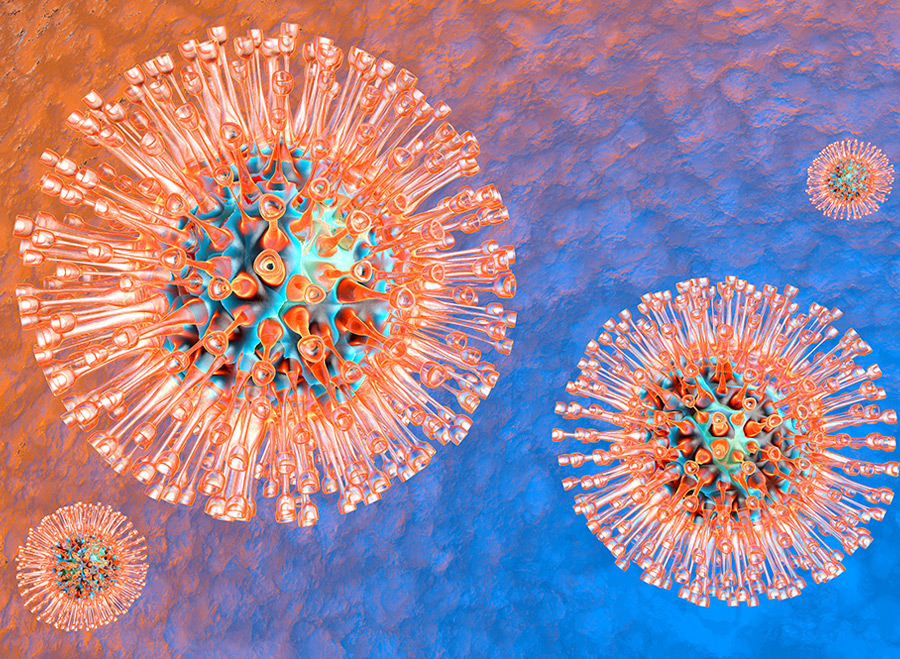
The herpes virus HCMV has the “potency to be responsible for at least part of ADHD cases.” 7
Learn more about how infections can trigger neuropsychiatric symptoms

Cunningham Panel™ helps identify an autoimmune disorder in child initially diagnosed with schizophrenia
Researchers describe a complex case involving a 15-year-old girl, who abruptly developed multiple neurologic and psychiatric symptoms.
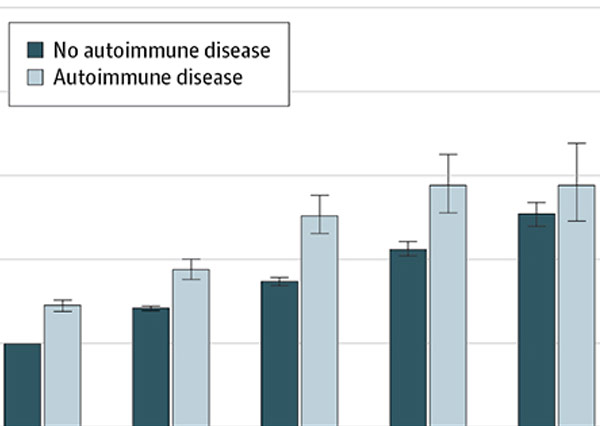
Autoimmune diseases and severe infections as risk factors for mood disorders: a nationwide study
This nationwide, population-based, prospective cohort study examines the link between mood disorders, infections, and autoimmune disease.
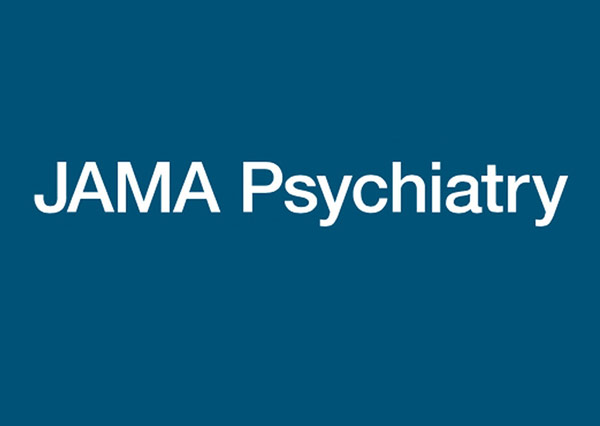
Childhood infections can increase risk of mental illness in kids
Nationwide study finds both mild and severe infections can increase risk of mental disorders in children and adolescents.




